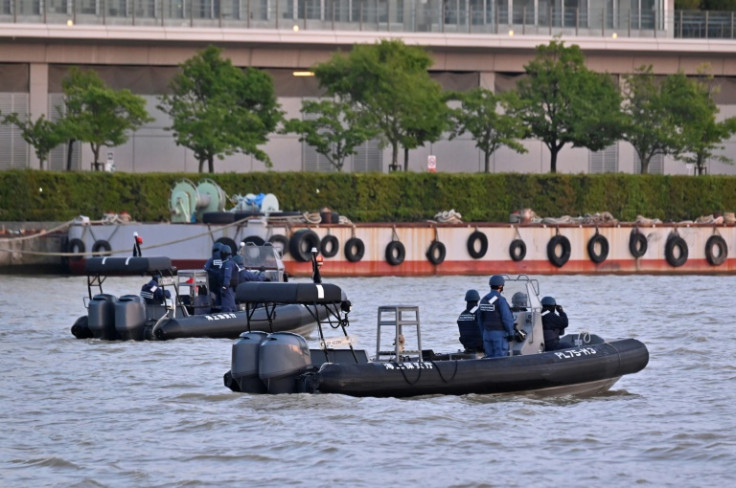Residents in shock as Japanese river turns blood red
The images of the crimson-colored coloured river went viral on social media earlier this week.

A river in Nago City, Japan, turned blood red following a leak from a beer factory leaving the residents worried.
The images of the crimson-colored coloured river went viral on social media earlier this week. The factory officials later confirmed that it was caused by a food colouring dye.
They said that the dye managed to find its way to the river through a rain gutter. The beer factory, Orion Breweries, also issued a statement apologising for "causing enormous trouble and worry," per a report in The Independent.
"We believe it was caused by the leakage of propylene glycol – a food additive listed in enforcement regulations of the Food Sanitation Act – contained in cooling water used to cool our factory facilities. We believe the leaked cooling water flowed into a river through a rain gutter, causing the sea to turn red," Orion Breweries said.
Residents of a resort city in Okinawa, Japan woke up Tuesday to find an area of usually clear blue water had turned red.
— Bloomberg Quicktake (@Quicktake) June 29, 2023
The culprit was a beer plant leak, where a coolant used to regulate the temperature of brewing equipment flowed into a nearby river https://t.co/rRGlSjIeuM pic.twitter.com/7CldhCq3Yw
The river turned red due to a chemical called propylene glycol, a common food additive. According to the US Center for Disease Control and Prevention, propylene glycol is used by the chemical, food, and pharmaceutical industries as an antifreeze.
It is "generally recognized as safe," but frequent exposure to propylene glycol may irritate the skin.
#Japanese river turns blood red, alarming residents
— CHAUDHRY IMRAN (@chimran55) June 29, 2023
A food colouring leak in a port in #Japan left a flowing river blood red in #colour alarming residents about the #mysterious change.
Visuals of the river in #Nago city in #Japan Okinawa showed that the water had turned deep red… pic.twitter.com/wQNH6863EC
Chemicals and pollutants making their way from factories to rivers and lakes remain one of the major causes of concern. Several similar incidents have been reported over the years from different parts of the world.
In 2014, a river in Shanghai turned a sky-blue colour after the Changqiao Water Plant in Shanghai's Xuhui District released coloured wastewater into a river near Chunshen Harbour, which links the Dingpu and Huangpu rivers.
In 2012, reports emerged that the Jian River in Luoyang, China, had turned into a "river of blood" as a result of illegal dye dumping by a nearby chemical plant.
The river, which runs through Luoyang in Henan province, was a reddish colour for several days before officials tracked down the source of contamination. Locals said they were not surprised as the river regularly changes colour because of pollutants from domestic waste being dumped into it, with residents saying it had turned dark green in the past.
Around 26% of the global population lacks safe drinking water, per a report presented at the UN 2023 Water Conference held in New York this year.
The report titled "UN World Water Development Report 2023" stated that as many as 2 billion people do not have access to safe drinking water and 3.6 billion lack access to well-managed sanitation facilities.
The report added that nearly half of the world's urban population may face water scarcity if steps are not taken urgently to address the issue.
Another United Nations report warned that some 600 million children—one out of every four worldwide—will live in areas with extremely limited water resources by 2040.
Warmer temperatures, more severe weather, rising sea levels, increased floods, deadly droughts, and melting ice will affect water supplies.
Shortages will be accrued by a global increase in demand for water, driven largely by industrialisation, population growth, demographic shifts, food production, and increased consumption.
The situation in the UK is no better, according to a report published by a House of Commons Committee last year, no river in the country is free of chemicals. Untreated sewage and agricultural runoff are the major factors causing pollution in the river.
In 2022, the UK's Environment Agency found that as many as nine water and sewerage companies in England had failed to perform. The agency assessed nine such companies for the year 2021 and found that their performance had fallen to its lowest level.
The report found that these firms continued to allow sewage to be discharged into water bodies in the UK. Southern Water and South West Water received just one-star ratings, while Anglian, Thames, Wessex, and Yorkshire were rated only two stars for their dismal performance. The agency had even called for their chief executives and board members to be jailed.
© Copyright IBTimes 2025. All rights reserved.






















